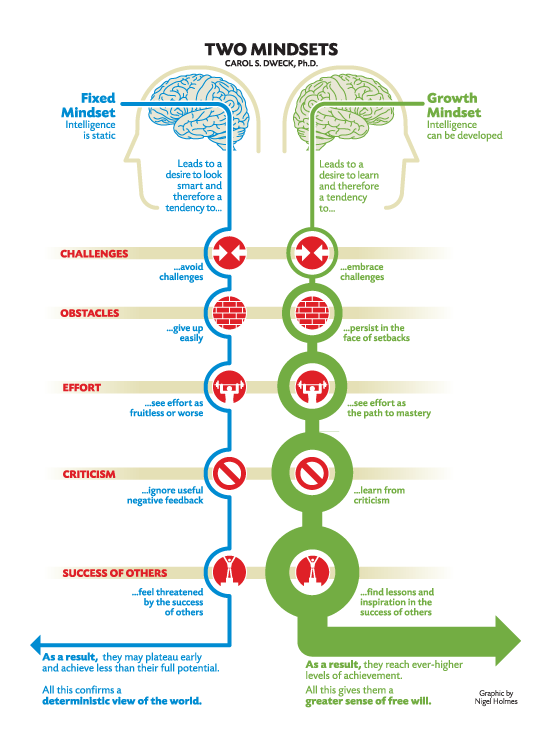When a student enters a study session, they have one of two mindsets. They either have a fixed mindset, which basically makes the brain believe that they know all they are capable of knowing about a certain topic and there cannot be any improvements or changes. Or, they could have a growth mindset, which acknowledges obstacles and trouble areas, but sees them as opportunities to learn and grow.
Fixed Mindsets
People with a fixed mindset are concerned about looking smart to those around then, so they are less likely to embrace change and have a harder time accepting criticism. They believe they just aren’t programmed to succeed in certain areas and in turn become easily distracted, frustrated and uninterested in learning. They believe they can not improve their intelligence, that it is limitless and useless to try to do anything about it. These students often say things like “I’m not a math person” or “I’m great an English but my brain just doesn’t GET math.”
Growth Mindsets
People with a growth mindset believe that the skills and abilities they have when it comes to a certain subject are just jumping off points, and the possibilities are endless when it comes to what they can do and learn. A student with a growth mindset learns because they love to learn.
The Brain’s Reaction to Messages
The brain responds to the messages it receives. If a child constantly says “I can do this!” the brain will respond positively with “Yes, you can!” On the other hand, if a frustrated student lacking confidence repeatedly tells him/herself “I’m horrible at this!” the brain will agree with messages such as “You’re right, don’t even try.” Parents and tutors want to establish a growth mindset in the child they are working with, and there are a few ways you can transform a fixed mindset into a growth mindset. One of the biggest ways to do this involves one of the smallest words in the English alphabet: YET
Using YET
When a child is taught to say ‘I don’t know how to do fractions…yet” their brain understands that even though it is a roadblock right now, there is a confidence that success is coming. Adding the powerful word “yet” to any negative thought turns it into a positive and hopeful affirmation.
When a child stops believing the lie that they are as smart as they are ever going to be and that their abilities are limited, they will tap into a world of potential that will have not only their grades soaring, but their self confidence as well.
http://qz.com/139453/theres-one-key-difference-between-kids-who-excel-at-math-and-those-wh

